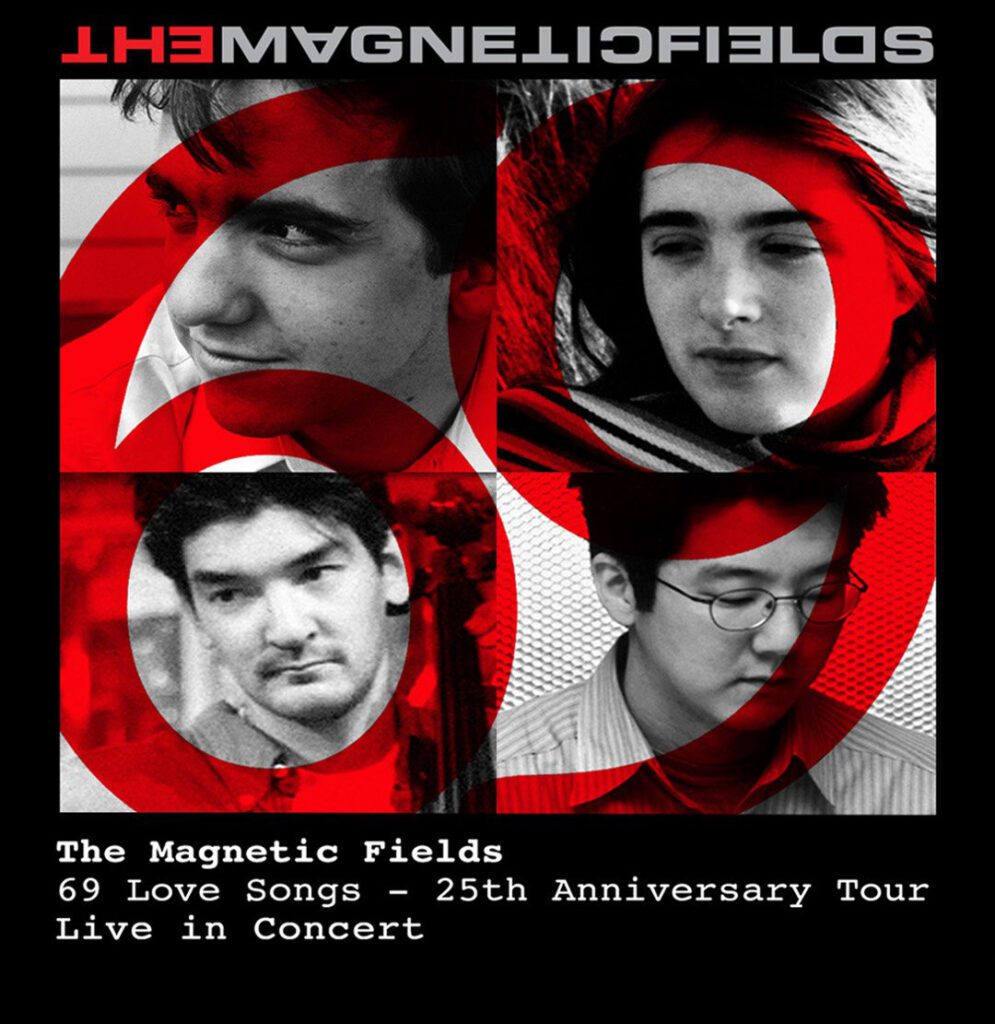Stephen Merritt’s challenge to himself, at the end of the last century, was to write 100 love songs. He had been inspired by hearing a piano bar revue of Stephen Sondheim’s works—and by 114 Songs by Charles Ives, the composer born 150 years ago this weekend, as it happens.
He only got to 69 Love Songs. But that was fine, or maybe better, as it fit his droll style. The epic songscape is marking its 25th anniversary this year, sparking a series of two-night concerts in which it’s played in order, 35 songs the first night and 34, the second with no additions or changes possible. The whole project is something of a math problem, after all, with some of the songs of the first night’s set Thursday at the Lincoln Theatre, (“Roses” specifically) originally clocking in at only 27 seconds, and three others were written at just under a minute.


Reacting to a single yelled request, the ever-deadpan Merritt advised that those who requested songs that were not next one on the list would be fed to alligators; and those who needlessly requested songs that would be next would cause them to just skip the song altogether. So it was a bit of a recital of the assembled seven-piece Magnetic Fields, all of whom were pretty much sitting down, like the audience. Unlike the very fanciful playhouse stage setting and colorful costuming the last time the band played the venue, for the 50 Song Memoir in 2017, this was a very plain presentation, bordering on drab.
Merritt sat at right, in an ELO T-shirt, barely playing any instruments (except for key triangle at one point and a moo-cow toy elsewhere). The main event, as always, was his deep baritone, which seems to have gotten even deeper over the years. As it was, he tilted his head and stretched his neck as if to empty out the furthest reaches of every low note.
Sam Davol bowed a tiny, long-necked tabletop cello next to him; John Yoo switched from guitar to banjo; Shirley Simms played her autoharp and ukulele; Anthony Kaczynski played guitar in the back but stood to sing the first evening’s concluding “Promises of Eternity.” Chris Ewen played all manner of keyboards and computer triggers for various backing tracks and rhythms—there was no drummer on stage. And there was a lot more electronic dabbling in the songs than one might have recalled.
The usual go-to female vocalist, Claudia Gonson, sat on a couch-like chair in the back and stood only when it was time for her to take lead vocals on a handful of songs. In the past, she played piano as well. The spareness gave some songs their homemade appeal and emotional directness, even when the emotion was despair. And there was poignancy in songs maybe he didn’t think he’d be singing a quarter century later, as on “Time Enough for Rocking When We’re Old.” “But tonight, I think I’d rather just go dancing,” the chorus goes; but no, everybody was sitting.


Merritt seemed amused at how many of the songs concerned animals, and was sure to point each of them out—“A Chicken with Its Head Cut Off,” “Let’s Pretend We’re Bunny Rabbits,” “Fido, Your Leash is Too Long,” and even “Boa Constrictor.” As offhand as some of Merritt’s songs seem, thrashing out on “Punk Love” or extending the oddball eclecticism on “Love is Like Jazz,” some songs just suddenly stood out for their striking turn or phrase or honest emotion, as in “You’re My Only Home.” Or in “If You Don’t Cry,” the verse goes, “then you just don’t feel it any more.”
A lot of the songs seemed to balance on staying or leaving; a number had to do with the emptiness following love (“The Cactus Where Your Heart Should Be”). But the best of them simply reflected the lightness at the height of romantic joy, such as “The Luckiest Guy on the Lower East Side,” handled by Kaczynski, or the momentary dreaminess in “Nothing Matters When We’re Dancing.”
Many in DC likely bought tickets for both nights of the presentation. But those throwing in for a single night had to balance the riches. Yes, night two had local favorite “Washington D.C.,” but the first night had what’s likely the biggest hit from 69 Love Songs—the droll and memorable “The Book of Love” (“is long and boring,” the lyrics go), a number that even Peter Gabriel has covered.
It sounded great on opening night. But despite all the restrictions and regimentation of the order, one hoped upon hope there might be a single exception to the rules—maybe in an encore? Please? “Washington D.C.” for the locals on the first night?
But no. It would be performed as the second song of the second night, as was written in The Book of Love.
Instead at the end, a deadpan announcement: “There will be a 22 hour break before our next set.”
